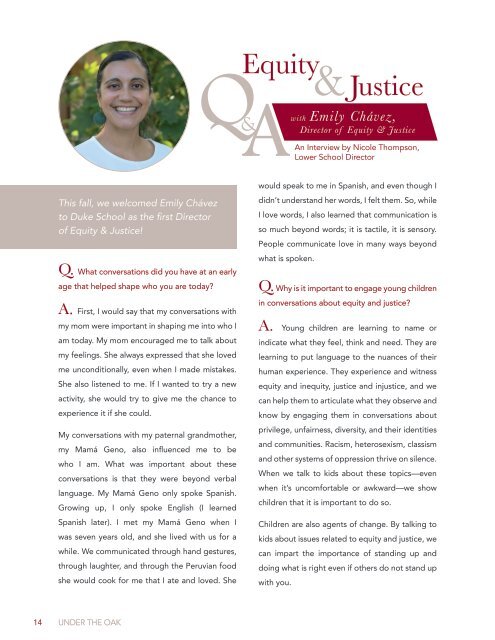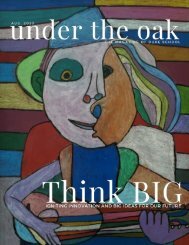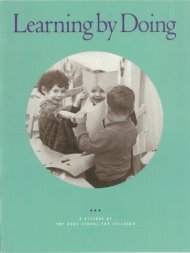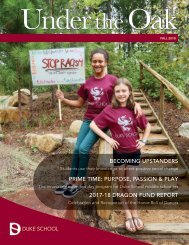You also want an ePaper? Increase the reach of your titles
YUMPU automatically turns print PDFs into web optimized ePapers that Google loves.
Equity<br />
& Justice<br />
An Interview by Nicole Thompson,<br />
Lower <strong>School</strong> Director<br />
This fall, we welcomed Emily Chávez<br />
to <strong>Duke</strong> <strong>School</strong> as <strong>the</strong> first Director<br />
of Equity & Justice!<br />
Q. What conversations did you have at an early<br />
age that helped shape who you are today?<br />
A. First, I would say that my conversations with<br />
my mom were important in shaping me into who I<br />
am today. My mom encouraged me to talk about<br />
my feelings. She always expressed that she loved<br />
me unconditionally, even when I made mistakes.<br />
She also listened to me. If I wanted to try a new<br />
activity, she would try to give me <strong>the</strong> chance to<br />
experience it if she could.<br />
My conversations with my paternal grandmo<strong>the</strong>r,<br />
my Mamá Geno, also influenced me to be<br />
who I am. What was important about <strong>the</strong>se<br />
conversations is that <strong>the</strong>y were beyond verbal<br />
language. My Mamá Geno only spoke Spanish.<br />
Growing up, I only spoke English (I learned<br />
Spanish later). I met my Mamá Geno when I<br />
was seven years old, and she lived with us for a<br />
while. We communicated through hand gestures,<br />
through laughter, and through <strong>the</strong> Peruvian food<br />
she would cook for me that I ate and loved. She<br />
would speak to me in Spanish, and even though I<br />
didn’t understand her words, I felt <strong>the</strong>m. So, while<br />
I love words, I also learned that communication is<br />
so much beyond words; it is tactile, it is sensory.<br />
People communicate love in many ways beyond<br />
what is spoken.<br />
Q. Why is it important to engage young children<br />
in conversations about equity and justice?<br />
A. Young children are learning to name or<br />
indicate what <strong>the</strong>y feel, think and need. They are<br />
learning to put language to <strong>the</strong> nuances of <strong>the</strong>ir<br />
human experience. They experience and witness<br />
equity and inequity, justice and injustice, and we<br />
can help <strong>the</strong>m to articulate what <strong>the</strong>y observe and<br />
know by engaging <strong>the</strong>m in conversations about<br />
privilege, unfairness, diversity, and <strong>the</strong>ir identities<br />
and communities. Racism, heterosexism, classism<br />
and o<strong>the</strong>r systems of oppression thrive on silence.<br />
When we talk to kids about <strong>the</strong>se topics—even<br />
when it’s uncomfortable or awkward—we show<br />
children that it is important to do so.<br />
Children are also agents of change. By talking to<br />
kids about issues related to equity and justice, we<br />
can impart <strong>the</strong> importance of standing up and<br />
doing what is right even if o<strong>the</strong>rs do not stand up<br />
with you.<br />
14 14 UNDER THE OAK








![Under the Oak 2023 [FINAL5] (1)](https://img.yumpu.com/68405392/1/190x245/under-the-oak-2023-final5-1.jpg?quality=85)








